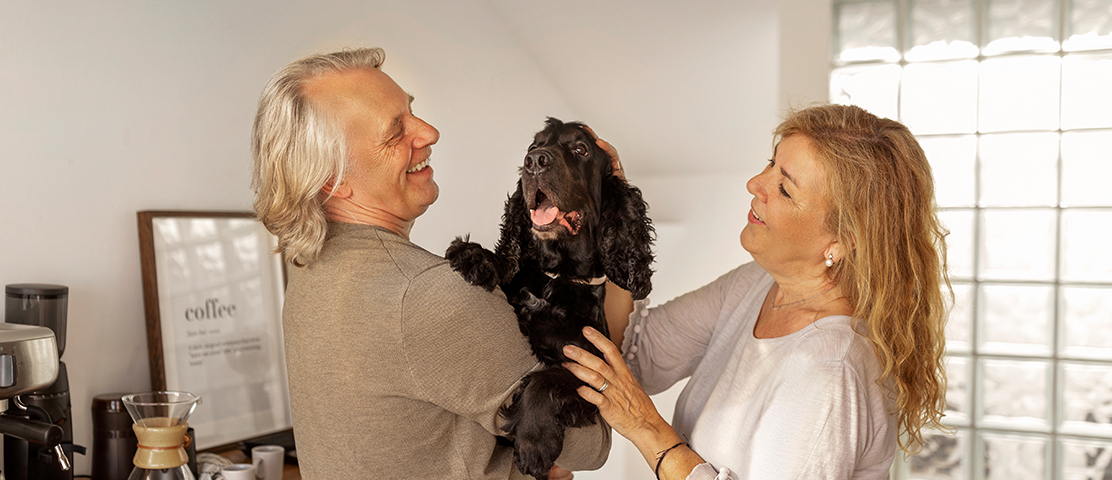The emotional benefits of dogs for the elderly are numerous and profound. Having a refreshing walk with your dog is in itself an incomparable and joyful activity. Studies show that dogs are particularly good at sensing their owner’s emotional state, and are ready to act in ways that bring a smile to their face, even if they have to play goofy for a while. Also, the dog will cuddle in his lap so as to make him realize how important he is. Let’s explore in detail all the top emotional benefits of having a dog in your senior years.
Unconditional Love and Companionship
One of the greatest emotional benefits of dogs for the elderly is their unconditional love and companionship. Above all, dog pets love their masters unconditionally which alleviates feelings of loneliness and depression. Dogs don’t judge their owners; whether a senior is nice or indifferent, the dog remains unchangeable, affectionate, and faithful. This constant companionship can significantly reduce feelings of loneliness, thus providing a consistent source of love and joy.
Reducing Loneliness and emotional support
As we have mentioned earlier, dogs provide emotional support for seniors in their loneliness. If a senior is feeling lonely or stressed, the dogs present themselves and try to cheer their owners up through whatever tricks possible. Overall, dogs are the best companions of human beings. They can be a source of comfort just by being there, sitting next to their owners, or engaging them in playful activities.
Boosting Mental Health and Alleviating Depression
Dogs are great emotional comforters. They offer significant mental health benefits of dogs for seniors. They can certainly help a depressed person stay afloat with their furry friendship. Not only that, the emotional bond with a dog can lead to a more positive outlook on life, directly impacting their mental well-being.
Encouraging Social Interaction and Engagement
The dog pets also convince the seniors to go out for a walk and that’s how they can strike up conversations with other dog owners. A good deal of socializing is done in this way. Not only that, just a solitary walk with your puppy friend is enough to cheer your spirit up.
Secondly, upon noticing that the senior is not doing well, the dog might play tricks or just sit silently to the side, or else convince the senior to walk down to the park. During the walk, dogs are the best companions: sometimes they walk behind you, sometimes ahead, and sometimes they might just run after a stray butterfly, thus protecting and amusing you in multiple ways.
Providing a Sense of Purpose and Routine
Caring for a dog is not at all easy (it is not boring either). It needs grooming and caring almost every day. The routine of feeding, grooming, and walking a dog provides daily tasks that can make seniors feel important and needed. So in a way, the dog gives a purpose to the senior, structuring his days, so that he can look forward to his responsibilities on waking up in the morning. In short, the dog finds a nice owner, and the owner finds a devoted companion.
Fostering a Positive Outlook on Life
Having a friendly dog on your side might conjure up the hopefulness of your youth in you. With the furry friend at your side, you might not feel as lonely as you used to, and your outlook on life might change for the better. And also the joy that such cheerfulness might arouse in your heart is incomparable. A single laugh from a senior is priceless.
Moreover, they are also good carriers. Let’s imagine a senior is sick in bed, and he wants his phone, toothbrush, or walet to be brought, if the dog is trained, it will do him the honors and bring the specific item for him without his getting out of the bed in cold winter.
Stress Relief and Memory Enhancement
Dogs are natural stress relievers. Petting a dog can lower stress levels and bring a sense of calm. Dogs are also great listeners, providing comfort simply by being present and offering a silent, understanding companionship.
Supporting Cognitive Health and Memory
The dogs help dementia patients to remember the good moments in their lives. Interacting with a dog, teaching them tricks, or playing games can stimulate the brain and help keep cognitive functions sharp. Singing to a puppy or petting it in your lap is a great stress reliever too, and it gives rise to all the good moments a senior has lived with his furry friend.
Creating Joyful and Happy Moments
Everyday moments with a dog can bring immense joy and happiness to seniors. Whether it’s playing fetch, going for a walk, or simply enjoying quiet time together, these interactions can create lasting memories and provide daily doses of happiness.
Enhancing Mood and Emotional Stability
The emotional stability that comes with owning a dog is another significant benefit. Emotional support dogs for the elderly provide consistent emotional support, helping to stabilize mood swings and providing a sense of calm. This emotional steadiness can be particularly beneficial for seniors, helping them navigate the ups and downs of daily life with greater ease and confidence.
Conclusion:
The emotional benefits of dogs for elderly individuals are many. From providing unconditional love to reducing feelings of loneliness, dogs play an essential role in enhancing the mental and emotional well-being of seniors. They help boost mental health, offer stress relief, and foster a positive outlook on life. Ultimately, having a dog in your senior years brings joy and comfort, making these furry friends invaluable companions for the golden years.



